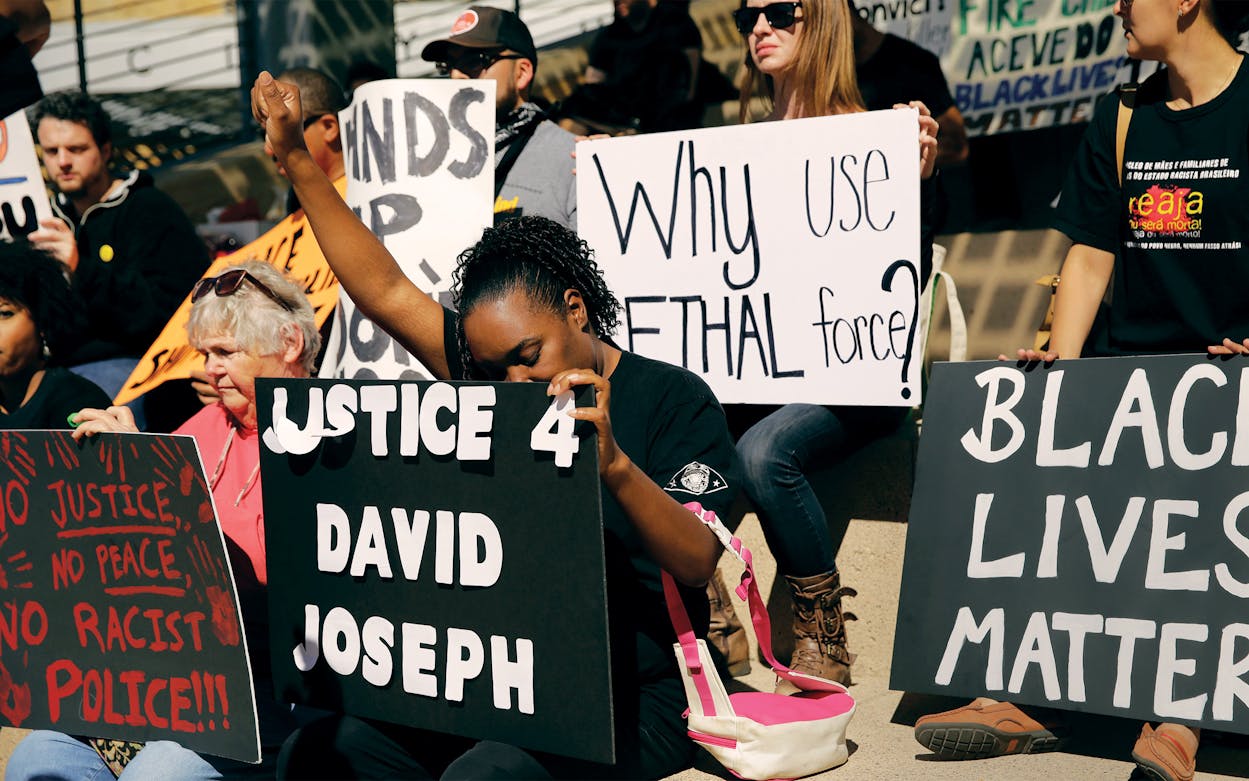On February 8, in broad daylight, David Joseph was shot and killed by Geoffrey Freeman, who was an Austin police officer at the time. Joseph was unarmed, completely naked, and high: an autopsy found traces of “antihistamine, marijuana, and Xanax” in his system. In Freeman’s statement immediately following the incident, he recalled issuing a set of commands to Joseph, and then the seventeen-year-old charged at the officer. Freeman shot Joseph twice and killed him, saying he feared for his life and was following department training.
A naked, unarmed teenager on a bunch of downers might not seem like a lethal threat, but a civilian review of the internal investigation does show why Freeman might have thought he was following his training, even if the department’s policy says otherwise. The Citizen Review Panel report found that a trainer at the Austin Police Training Academy didn’t emphasize de-escalation techniques.
The report quotes the unnamed trainer as saying, “Here in Texas, here in APD, we don’t have a duty to retreat, and we are not asking our officers to retreat all the way out the door and get back in their cars and go home.” He adds that officers “need to take some kinda action” and that de-escalation is up to the an officer’s discretion. “I can understand why he (Freeman) did that,” the report quotes.
The citizens panel has recommended the trainer be removed from the Austin Police Training Academy. The damage, however, is already done. Joseph is dead. And the trainer has been a part of APD for fourteen years and training cadets in Austin for a decade. The report went as far as to say that the trainer’s mindset “will likely propagate to new recruits that de-escalation need not be part of the tool-kit of new officers.”
The officer was fired last week, and Austin’s Police Chief Art Acevedo laid out four department policies that Freeman violated in the fatal shooting: Response to Resistance; Determining the Objective Reasonableness of Force; Substance Induced Excited Delirium; and Neglect of Duty. In a nine-page memo, Acevedo wrote that Freeman failed to wait for backup when he was aware more officers were going to arrive on the scene. Acevedo continued on, saying “no one was under a threat of imminent harm of suffering serious bodily injury or death by Mr. Joseph.” Acevedo said Freeman waited about 6.7 seconds to shoot Joseph, and that backup came less than two minutes later.
If Freeman would have waited or properly de-escalated this situation, it all could have been different. But the trainer’s blasé attitude towards de-escalating situations seems to add to the idea that officers are ill equipped to respond any time they feel threatened in the least. Breaking the law or disobeying police shouldn’t lead to a death sentence, but too often it does. Sandra Bland was pulled from her car by an officer during a routine traffic stop, and days later she was found dead in a jail cell. Tamir Rice, a twelve-year-old, was killed by police while he was playing with a toy gun.
A the New York Times noted, at a policing conference in February, Dallas Police Chief David O. Brown hinted that officers often don’t know how to respond. “Sometimes it seems like our young officers want to get into an athletic event with people they want to arrest,” he said. “They have a ‘don’t retreat’ mentality. They feel like they’re warriors and they can’t back down when someone is running from them, no matter how minor the underlying crime is.” In Freeman’s case, that extended beyond “young” officers: he was an eleven-year APD veteran at the time of the shooting.
According to the New York Times, new officers throughout the country, on average, spend 58 hours on firearms training, another 49 on defensive tactics, but only eight hours on de-escalation. From that data, and the revelation from the Citizen Review Panel, it doesn’t seem that de-escalation techniques are among most police department’s top priorities. That’s troubling. American citizens’ safety is at risk if police aren’t concerned with your well being if you commit petty crimes.
Police officers put their life on the line daily. That’s frightening, but that shouldn’t give officers to shoot anytime they are uneasy or scared. Without proper training, the stakes are much more dire than pretty much every other job out there. It’s an officer’s responsibility to make sure every party walks away alive if possible, but if their training doesn’t reflect that, it’s hard to understand how that’s possible.
Editor’s note: The name of this article has been edited for clarity.






